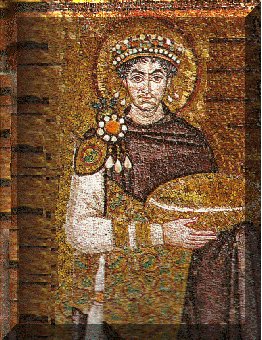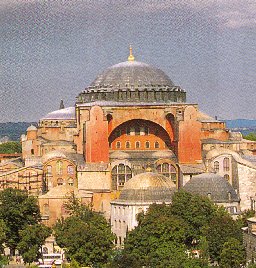|
|
|
Basileus

Justinian Re-conquer the West for the Eastern Romans; eventually extended his power back to Africa, Italy and Spain. The last of the Caesars, who inadvertantly heralded in the Byzantine age.
In his Capital of Constantinople,
Justinian
caused to be built the greatest
building the Empire had seen: Hagia Sophia, complete with the state-of -the art
earthquake-proof dome. This monster represented the height of East Roman
architecture. When it was consecrated, Justinian, Supreme Head of the Christian
Church, rode up to the high alter, and proclaimed "ah, Solomon, I have
outdone thee!"
Justinian had been born a peasant in what is now modern Yugoslavia. His uncle, Justin, had joined the Roman army, and had become a distinguished officer. Justin eventually became Head of the Palace Guard. The palace in Constantinople, the Imperial capital, was a large complex, sheltering the Emperor, who, following the reforms of Diocletian in the late third century, was a figure distant to the populace, appearing only in much ceremony and pomp. The Augustus wore robes of purple, adorned with jewels, and made public appearances along with the singing of hymns in his honour, much incense, and adoring courtiers, as befitted the Temporal and Spiritual ruler of one quarter of the world's population. This ceremonial had been instigated to protect the person of the Emperor, vital for his own safety, and the stability of the Empire.
The Empire had also been divided into two administrative halves by Diocletian, who saw local Emperors as being far more able to deal with security issues, and more effective in halting barbarian incursions into the Imperium. The senior Emperor was the ruler in the East. These reforms worked well enough to allow Diocletian the chance for a peaceful retirement, but did not endure the ambition of Constantine, who, eager to succeed his father as an Emperor in the West, obliterated all of his colleagues, and ruled as sole Emperor. Constantine had swept to power in 312, in his eyes, because he had adopted the standard of the Chritian God who appeared in a vision to him before his decisive victory at the Milvian Bridge outside Rome. Constantine promptly legalised the subversive cult of Christianity, and, alongside his office of Pontifex Maximus, (Chief Priest of the Pagan Olympian religion), took up the role of "Bishop of those outside of the Church", sinking a lot of cash into church building, helped decide an official Orthadox creed that bolstered his own position and promoted the Patricians wishing to convert to Christianity to Senatorial ranks as his advisory council. Constantine moved the Capital to the Greek city of Byzantium, to be Constantinopolis, New Rome.
Following Constantine's death, the Empire reverted to its East West split, with the centre of power being firmly in the east. As barbarian forces built on the boarders, the Western Emperors lacked the money, manpower and support to counter them decicively. The Eastern Emperors, on the other hand, keen to divert the nations of Goths, displaces by invading Huns, from settling in Eastern territories, granted them lands to settle on in the west. Goths, Franks and Vandals settled in the western lands, adopting the Imperial religion, Christianity, and Roman culture and customs. The Barbarians held the land in exchange for defending it from the more barbarous forces, such as the Huns, ravaging Germania and the central European Steppes. Roman culture was largely preserved in the west, the barbarian kingdoms held united by the Roman Christianity; the Bishops, the Senatorial class exercised temporal and spiritual power, the barbarian kings upholding the defence of Roman lands and enforcing Roman law.
Meanwhile, in the Ease, the Emperor Anastasius was dead. The succession was unclear; taking advantage of the moment, the head of the Palace Guard, Justin, staged a coup, and siezed Imperial power for himself. He was aided by his nephew, who he had summoned some years previously to the capital, and who had become an officer in the guard. Justin adopted his nephew as son and heir once his position was consolidated. Justin's administrative skills were limited, so Justinian adopted the role of Consul, and assisted his uncle in the Imperial administration, and presented the public face of the Emperor, appearing at the Hipodrome to present games. On such an occasion Justinian saw, and fell in love with a circus performer, the actress Theodora. Justinian faced scandal, but courted and married her anyway, the law having to be changed to allow a senator to consort with an actress.
On the death of Justin, Justinian succeded,
Thoedora his Empress. Justinian quickly set about a codification of Roman law,
completed in record time, and a legacy inherited by east and west alike.
However, Ju stinian
was not wholly popular, and taxation helped cause riots against him. With the
whole of the capital in riot, the Emperor prepared to flee, but Theodora held
firm, and bolstered his resolve. Justinian was reluctantly forced to play his
winning card, and the army under the General Belisarius cleared the streets, and
restored order with much slaughter. To win over the populace, Justinian proposed
to give them glory. He sent Belisarius to North Africa, to take back the
provinces from the Vandals. The Vandals, ruling in Roman fashion, were a greatly
larger force than Belisarius had; yet in two years North Africa was his, and he
paraded in Triumph in Constantinople, bringing riches, weath and the Vandal King
in chains with him. Justinian saw the success as a good omen. Belisarius was
dispatched to Italy to reconquer Rome, and a massive building programme was
instigated throughout the East, including the massive earth-quake proof church
of Holy Wisdom in Conmstantinople, Agia Sophia.
stinian
was not wholly popular, and taxation helped cause riots against him. With the
whole of the capital in riot, the Emperor prepared to flee, but Theodora held
firm, and bolstered his resolve. Justinian was reluctantly forced to play his
winning card, and the army under the General Belisarius cleared the streets, and
restored order with much slaughter. To win over the populace, Justinian proposed
to give them glory. He sent Belisarius to North Africa, to take back the
provinces from the Vandals. The Vandals, ruling in Roman fashion, were a greatly
larger force than Belisarius had; yet in two years North Africa was his, and he
paraded in Triumph in Constantinople, bringing riches, weath and the Vandal King
in chains with him. Justinian saw the success as a good omen. Belisarius was
dispatched to Italy to reconquer Rome, and a massive building programme was
instigated throughout the East, including the massive earth-quake proof church
of Holy Wisdom in Conmstantinople, Agia Sophia.
However, the success was not to last. Bubonic plague ravaged the empire, and attacks from the Persians forced Belisarius to be re-called and defend the eastern frontier. The death-toll cause by the plague made Imperial income plummet, and Justinian was forced to make unpopular and unfair taxation demands to bolster the Imperial frontiers and to fund his foreign campaigns. When Italy was finally taken, after ten years of warfare, it was broken and ruined, although with his additional success in Spain, and the Persians bought off, the Mediterranean was once again a Roman lake.
This was not to last. As last of the Emperors to rule the whole Mare Nostrum, Justinian was the last of the Caesars. After his death, much of Italy was lost to the Lombards, who ruled Italy as the Goths had done. The new religion of Islam inspired the Arabs to sweep across North Africa and Spain, taking land from the Persians as much as the East Romans. Eventually the Empire became more of a Super-Kingdom, a Greco-Roman state jockying for power along with the other realms of Europe and Asia. But surviive it did, and as the Byzantine Empire, remained strong until 1455, when it finally fell to the Ottoman Turks.
![]()
the BEST Byzantine link ever...amazing CGI re-constructions
Fun link : continuation of Roman Empire in the East
Byzantine links site